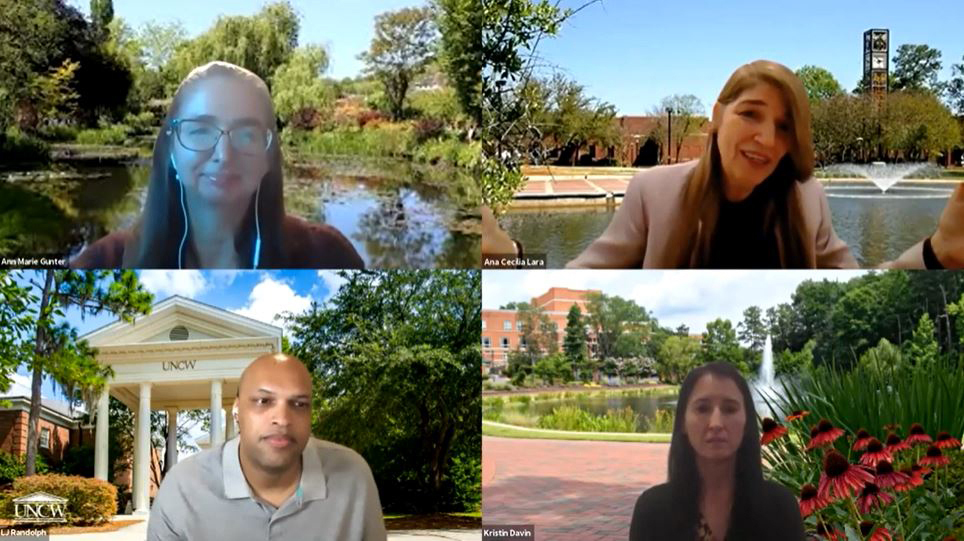
On Dec. 8, 2020, pedagogical experts on world language instruction from across North Carolina participated in “The Future of Language Learning in North Carolina,” a virtual panel discussion about the direction of teaching and learning of world languages in the state. The panel was held in conjunction with Carolina’s sixth annual Learning through Languages High School Research Symposium, which allows world language students in North Carolina to deepen their language studies through project-based learning.
During the panel, experts from the North Carolina Department of Public Instruction (NCDPI) and the schools of education at UNC-Charlotte, UNC-Pembroke and UNC-Wilmington discussed the evolving demographics of North Carolina and the demands placed on educators to address new needs and incorporate innovative developments in pedagogy and technology.
Kevin Fogg, associate director of the Carolina Asia Center and coordinator of the panel, provided welcoming remarks and Ann Marie Gunter, world languages consultant at NCDPI, moderated the discussion. Gunter was joined by L.J. Randolph, associate professor of Spanish and education and coordinator of world language teacher education at UNC-Wilmington; Ana Cecilia Lara, director of foreign languages and coordinator of Spanish teacher licensure at UNC-Pembroke; and Kristin J. Davin, associate professor of foreign language education in the Cato College of Education at UNC-Charlotte.
Panelists emphasized the importance of not only developing proficiency in a language, but also developing cultural competency and the ability to better understand the world.
Randolph argued that students need to be taught about global challenges and explained how learning world languages can help students meet these challenges.
“We’re recognizing more of the transformative power of language learning,” Randolph said. “The language classroom is uniquely situated to really seamlessly embed some of those topics into our curriculum, for example anti-racism and other social justice related issues, because they matter to our students and our students are the ones in the future who are going to be addressing these issues.”
LESS-COMMONLY TAUGHT LANGUAGES AND HERITAGE LANGUAGES
The webinar also included discussions about supporting less–commonly taught languages (LCTL) and engaging with heritage speech communities.
Davin highlighted that through innovative programming, such as the NC Virtual Public School, North Carolina offers a wide array of high school and middle school language courses to students, further increasing accessibility to less-commonly taught languages, including Russian, Arabic, Japanese, Greek and Hindu-Urdu.
Panelists agreed on the importance of maintaining heritage languages, many of which are less-commonly taught.
“The home language survey that’s done every year shows that over 300 languages are spoken in K-12 students’ homes across the state,” said Davin. “It’s important to consider how we support those students in becoming bilingual and biliterate with their first, or sometimes called heritage languages,” Davin said.
LEADING IN LANGUAGE LEARNING
“North Carolina is a national leader in language learning. As a local-control state, our schools decide which languages to offer that best fit their community’s needs,” Gunter said. “Currently 18 different languages are being offered in K-12 schools across the state, and annual enrollment data shows that more students are taking more languages over time.”
Lara emphasized that these trends must continue.
“North Carolina needs to remain at the vanguard of language learning,” Lara said. “We are a leader in foreign languages, and we need to continue to do this.”
Fogg, on behalf of the area studies centers, was proud to coordinate this session. He emphasized that, “UNC-Chapel Hill is a leading institution for language study in the state of North Carolina, but we also work hard to support language and area studies learning throughout the state. This panel, in conjunction with our Learning through Languages competition for high school students, is supporting secondary language education across a wide variety of languages.”
There were 95 guests who participated in the webinar, including UNC-Chapel Hill community members, K-12 teachers, students and university faculty.
This panel was a collaboration of the NC Department of Public Instruction and the area studies centers at UNC-Chapel Hill and Duke University, including the African Studies Center; Carolina Asia Center; Center for European Studies; Center for Slavic, Eurasian, and East European Studies; Duke-UNC Consortium for Middle East Studies; and the UNC-Duke Consortium in Latin American and Caribbean Studies.
By Sasha Schroeder ’22, UNC Global
